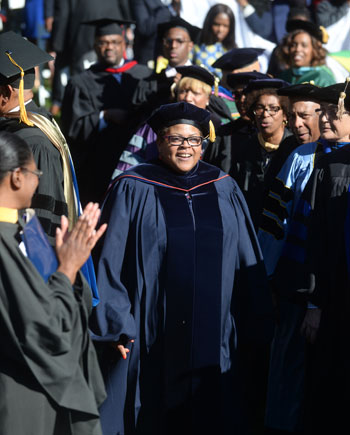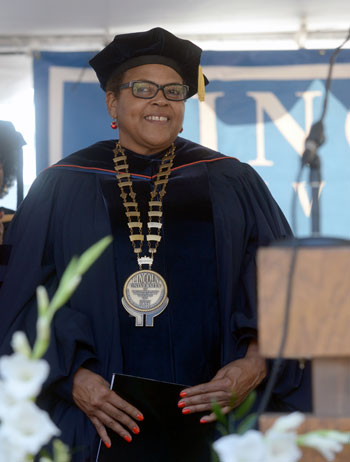- Posted in All University
- Category: Campus News
LINCOLN UNIVERSITY, Pa. – In the middle of Lincoln University’s campus on a sunny fall Friday afternoon, Brenda A. Allen was officially inaugurated as Lincoln University’s 14th president. Allen, a member of Lincoln’s Class of 1981, becomes the institution’s first alumna president. She was named president in May and began her tenure July 1.

President Brenda A. Allen processes through hundreds of cheering supporters before the investiture ceremony on October 20, 2017 where she officially became the 14th president of Lincoln University.
The 95-minute ceremony presided over by Board of Trustees Chairlady Theresa R. Braswell included welcoming remarks, reflections on the University’s history, music, and prayer.
Speaking to more than 600 guests seated in rows of white chairs on the lawn of the Thurgood Marshall Living Learning Center — named in honor of one of the University’s most distinguished graduates — Allen said, “As an alumna, I am acutely aware of the expectations I have accepted for moving our university into her next chapter.”
Donald Julian Reaves, chancellor emeritus of Winston-Salem State University, where Allen was provost for eight years before being named Lincoln president, said of his former colleague that Allen brought with her to Winston-Salem an “unwavering dedication to every member of the university community, especially to that of students.”
“She is an experienced and seasoned administrator with a fresh perspective,” Reaves said.
“This president has it all: the experience and even temperament, the needed skills and the personality…and wit…and smarts…and a big heart … and the warmth, all of which will be needed as she navigates the various constituencies and responds to the numerous demands that will be put before her.”
Representing the 13th District of Pennsylvania, House of Representatives member John Lawrence addressed the crowd as did the mayor of the nearby town of Oxford, Geoffrey L. Henry, who welcomed the new president, saying “We value Lincoln University as a good neighbor and an asset to the community.”
He said Lincoln’s ties to Oxford go back to before its founding when in 1832 John Miller Dickey became the pastor of Oxford Presbyterian Church. Henry said “both [Dickey] and his wife, Sarah, had a passion for education.”
Dickey went on to found Ashmun Institute in 1854, which was renamed Lincoln University in 1866 in honor of President Abraham Lincoln.
In her remarks, Allen cited Horace Mann Bond’s publication, “Education for Freedom”, in which he wrote that Lincoln University is the first institution founded anywhere in the world designed to provide higher education in the arts and sciences for youth of African descent.
“I am often amazed by the boldness of this idea,” Allen said. “Our founder, John Miller Dickey, had the audacity to propose educating Black people in a time when most in this nation viewed us a nothing more than chattel.”
She said that Dickey believed that a rigorous classical education would produce graduates able to influence the world.
The event kicked off with a procession lead by an ROTC Color Guard and by a faculty marshal bearing the ceremonial mace who was followed by more than 100 distinguished guests including trustees, faculty, representatives from other schools, student representatives, alumni, and elected officials, among others.
The formal investiture portion of the ceremony began with the oath of office administered by James A. Donaldson, professor emeritus of mathematics at Howard University and an alumnus and former acting president at Lincoln. The presentation of the University medallion was made by Chairlady Braswell, and a prayer was offered by the Rev. Aleyah Lacey of Mount Teman AME Church in Elizabeth, New Jersey.
In remarks that followed the official investiture, Allen focused on the importance of a liberal arts education, saying that a liberal arts education “continues to be the most powerful educational approach towards developing the intellectual skills needed to respond to the unprecedented market shifts so characteristic of today’s economy.”
She said, “A liberal arts education endeavors students to confront big questions facing society and to use knowledge gained across the academy towards providing positively to democracy."
"The phrase, education for liberation has been a rally cry of this institution for many decades. A rally cry heard by alumni like Nnamdi Azikiwe, Kwame Nkrumah, Thurgood Marshall to name a few. The world continues to need diverse voices from many perspectives as it seeks solutions to a myriad of social problems and concerns. Through the liberal arts, Lincoln can continue its tradition of educating those who change the world.”
“It is clear that this institution has always known how to prepare individuals to thrive in any area that they choose. And so being bold again will simply mean forcefully reiterating the contemporary relevance of our founding principles. Principles grounded in the idea of offering a rigorous liberal education towards the holistic development of our students.”

President Brenda A. Allen looks out onto the crowd gathered on the Thurgood Marshall Living Learning Center Lawn for the investiture where she officially became the 14th president of Lincoln University on October 20, 2017.
Allen said that in the early years of Lincoln, characteristics such as “diligence, zeal, eloquence and influence were graded alongside students’ mastery of content.”
“Such characteristics echo contemporary calls for college graduates with good communication skills who take initiative and who are able to thrive in uncertain situations. We must reimagine this approach to education so that our graduates leave prepared to soar.”
Near the end of her 17-minute remarks, Allen brought her remarks full circle, back to the founding of Lincoln by saying, “The early supporters of this great institution knew the power of a strong intellect for personal and professional revolution. Education that liberates graduates to take on the world must continue to be our highest priority.”
She recognized many of her closest supporters including her mother, Anna Allen, her late father, Lewis Allen, other family members present, and childhood friends from South Ninth Street in Newark, New Jersey, saying “Like you, I am also amazed that I am standing before you today.”
She acknowledged her former classmates, teachers and fellow alumni from Lincoln University and colleagues and friends at Howard, Yale, Smith and Brown universities. She gave special recognition to Ruth J. Simmons who she said, “As president of both Smith College and Brown University she created numerous opportunities for me to learn higher education administration. I am forever grateful for her selfless investment in me.”
Present were members of her Winston-Salem State University family, including Chancellor Emeritus Reaves and current Chancellor Elwood Robinson.
The ceremony included musical selections from the University band and the concert choir as well as a joint performance of “Order My Steps” by Glenn Burleigh.
Dunsin Fadojutimi, an electrical engineering student and native of Nigeria, attended the ceremony and said, “She has reinvigorated the alumni base, with her vision we hope to see a growth in the STEM areas so we can be competitive.”
Following the ceremony, the Inauguration festivities continued with a reception held on the Alumni House lawn. An evening Inauguration party held later in the same location capped off the Inauguration events.
The investiture was the culmination of a week of Inauguration activities. On Tuesday, faculty held a symposium on the topic “Higher Education’s Major Challenges in the 21st Century and their Impact on HBCU Survivability and Sustainability.” On Wednesday, staff held a tribute featuring performances, a gift presentation, and several videos. On Thursday, students held a symposium featuring an address by radio host Roland Martin, who earlier in the day broadcast live on campus for two hours.
View video of the investiture and program at www.lincoln.edu/inauguration.